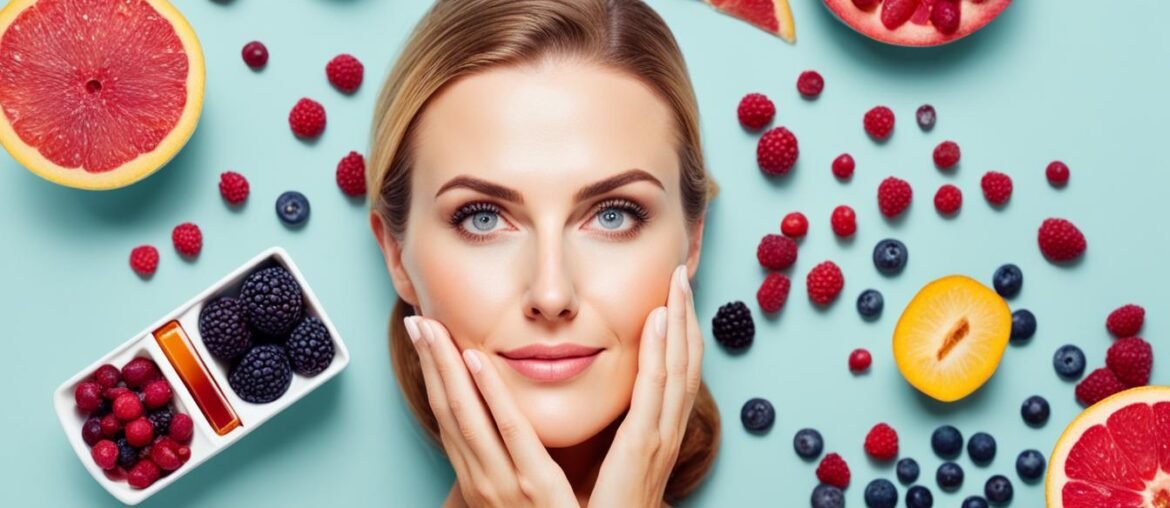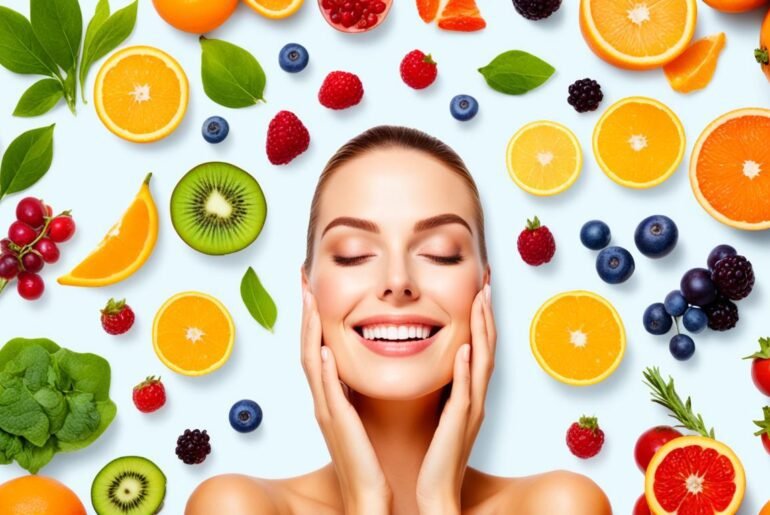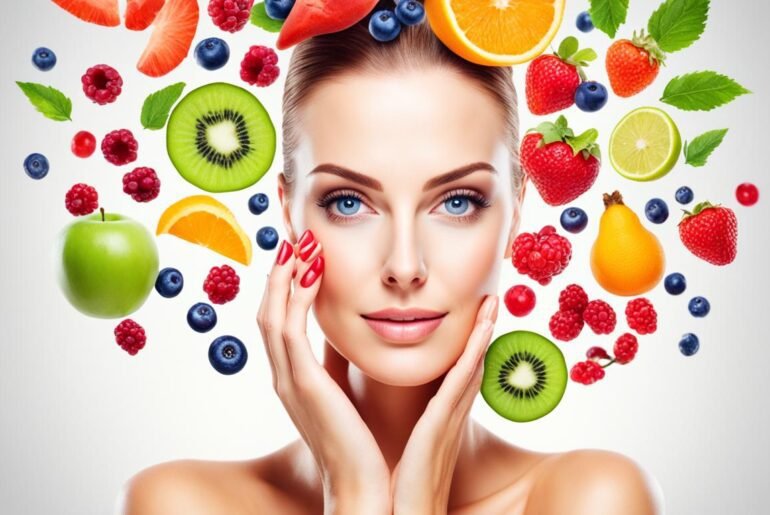Did you know that antioxidants have a profound impact on the health of your skin? These powerful substances, found in fruits, vegetables, and skincare products, can work wonders in improving your skin’s appearance and overall well-being. Antioxidants help combat harmful free radicals and oxidative stress, protecting your skin from damage and promoting a radiant complexion. Let’s explore the science behind antioxidants and discover how they can transform your skincare routine.
Key Takeaways:
- Antioxidants prevent or delay cell damage by countering free radicals and oxidative stress.
- Research suggests that antioxidants protect the skin from UV radiation, improve hydration, stimulate collagen production, reduce wrinkles and pigmentation, and support healing processes.
- Oxidative stress and free radicals contribute to skin aging, while antioxidants can help neutralize these effects and promote youthful skin.
- Antioxidants are found in foods such as fruits, vegetables, coffee, green tea, and spices.
- Incorporating antioxidant-rich skincare products can enhance your skincare routine and promote healthy, glowing skin.
The Role of Oxidative Stress in Skin Aging.
Oxidative stress and free radicals play a significant role in skin aging. The body is constantly exposed to oxidative stress through various metabolic activities and external factors such as pollution, tobacco, and alcohol. This oxidative stress can lead to accelerated aging and an increased risk of age-related diseases.
Oxidative stress occurs when there is an imbalance between the production of free radicals and the body’s ability to neutralize them with antioxidants. Free radicals are highly reactive molecules that can damage cells, proteins, and DNA, leading to visible signs of aging such as wrinkles, sagging skin, and uneven skin tone.
Research has shown that oxidative stress contributes to the breakdown of collagen and elastin, which are essential proteins for maintaining the skin’s elasticity and firmness. Additionally, it can lead to increased inflammation and impaired skin barrier function, making the skin more susceptible to damage from external stressors.
Antioxidants play a crucial role in combating oxidative stress by neutralizing free radicals and protecting the skin from damage. They act as scavengers, intercepting free radicals and preventing them from causing further harm. By doing so, antioxidants help to counteract the signs of aging and promote healthier, more youthful-looking skin.
Antioxidants have been shown to:
- Promote the repair of DNA damage caused by UV radiation
- Enhance hydration and moisture retention in the skin
- Stimulate collagen and elastin production
- Reduce the appearance of wrinkles and pigmentation
Antioxidants not only protect the skin from external damage but also support the skin’s natural healing processes, helping to repair and regenerate damaged cells.
To illustrate the impact of oxidative stress on skin aging, consider the following table:
| Factor | Effect on Skin Aging |
|---|---|
| Exposure to UV radiation | Increases oxidative stress and accelerates collagen breakdown, leading to wrinkles and sunspots |
| Pollution | Increases free radical production and inflammation, contributing to premature aging |
| Tobacco and alcohol consumption | Generate free radicals and deplete antioxidants, leading to skin damage and premature aging |
The Benefits of Antioxidants for Skin Health.
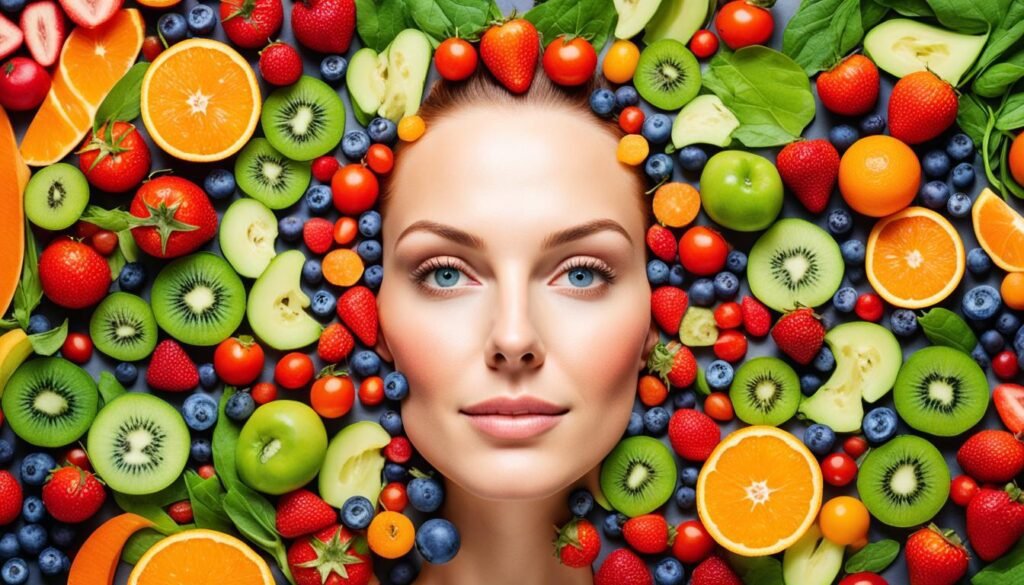
Antioxidants play a significant role in promoting skin health and protecting it from various environmental stressors. They offer a multitude of benefits that contribute to overall skin improvement, including:
- Protection from harmful UV radiation: Antioxidants act as a shield against the damaging effects of the sun’s ultraviolet (UV) rays, which can lead to premature aging and skin cancer. By neutralizing free radicals, antioxidants help minimize DNA damage and reduce the risk of sunburn.
- Improved hydration: Antioxidants help maintain the skin’s natural moisture balance, preventing dryness, flakiness, and dullness. They strengthen the skin’s barrier function, allowing it to retain moisture and appear more plump and supple.
- Stimulation of collagen and elastin production: Collagen and elastin are essential proteins responsible for maintaining the skin’s firmness and elasticity. Antioxidants stimulate the production of these proteins, promoting smoother, more youthful-looking skin.
- Reduction of wrinkles and pigmentation: Antioxidants combat the effects of oxidative stress, which contributes to the formation of fine lines, wrinkles, and age spots. They help even out skin tone, fade hyperpigmentation, and restore a more youthful complexion.
- Support for the skin’s natural healing processes: Antioxidants aid in repairing damaged skin cells and promoting faster healing. They can reduce inflammation, soothe irritated skin, and improve the overall recovery from environmental aggressors.
By reducing inflammation and neutralizing free radicals, antioxidants play a vital role in promoting healthy, radiant skin. Incorporating antioxidant-rich ingredients into your skincare routine can provide significant long-term benefits.
“Antioxidants provide a substantial line of defense against environmental aggressors, helping to protect the skin and enhance its overall health and appearance.”
Along with a balanced diet and lifestyle, antioxidant-rich skincare products can assist in maintaining optimal skin health. By supplementing your skincare routine with antioxidants, you can fortify your skin’s natural defenses and promote a youthful, vibrant complexion.
To better understand the benefits of antioxidants for skin health, let’s take a closer look at some key studies and research:
| Study | Findings |
|---|---|
| Study 1 | Highlighted the protective effects of antioxidants against UV-induced skin damage, including reduced erythema, inflammation, and DNA damage. |
| Study 2 | Explored the impact of antioxidants on collagen synthesis and demonstrated their ability to improve skin elasticity and firmness. |
| Study 3 | Examined the anti-aging effects of antioxidants and their role in reducing wrinkles, fine lines, and other visible signs of skin aging. |
These studies provide compelling evidence for the efficacy of antioxidants in skincare and further emphasize their importance in protecting and enhancing skin health.
Antioxidants in Foods.
When it comes to antioxidant-rich foods, nature has provided us with a bountiful selection of fruits, vegetables, and other dietary sources. These foods contain powerful compounds that can support overall skin health and contribute to a radiant complexion.
Food Sources of Antioxidants
Pomegranates: Known for their vibrant color and juicy seeds, pomegranates are a rich source of antioxidants, particularly ellagitannins and anthocyanins. These compounds help protect the skin from oxidative damage and promote a healthy glow.
Apples: An apple a day not only keeps the doctor away but also provides a dose of antioxidants. Apples contain flavonoids, particularly quercetin, which has been associated with anti-inflammatory and anti-aging effects on the skin.
Kale: This leafy green vegetable is packed with antioxidants, including vitamins A, C, and K, as well as lutein and zeaxanthin. These antioxidants help protect the skin from free radicals and support collagen production, keeping the skin firm and youthful.
Broccoli: Broccoli is a nutritional powerhouse, offering a wide array of antioxidants such as vitamins C and E, beta-carotene, and sulphoraphane. These antioxidants contribute to skin health by reducing inflammation and promoting a clear complexion.
Berries: From strawberries to blueberries, berries of all kinds are bursting with antioxidants. They contain high levels of anthocyanins, which have been linked to improved skin elasticity and protection against UV damage.
Coffee: Good news for coffee lovers: your daily cup of joe is a source of antioxidants. Coffee contains chlorogenic acid and other polyphenols that can help combat free radicals and reduce the signs of aging on the skin.
Green Tea: Green tea is not only a soothing beverage but also a skin-friendly elixir. It contains catechins, which are potent antioxidants that can protect the skin from UV damage, reduce inflammation, and promote a healthy complexion.
Cacao: Indulging in a square of dark chocolate can actually be beneficial for your skin. Cacao is rich in flavanols, which have been shown to improve blood flow, protect against sun damage, and enhance skin hydration and texture.
Herbs and Spices: Many herbs and spices used in cooking are packed with antioxidants. Turmeric, ginger, cinnamon, and oregano are just a few examples that can provide flavor to dishes while contributing to healthy skin.
These antioxidant-rich foods can be easily incorporated into a healthy diet to enhance skin health. Whether enjoyed as a fresh salad, a flavorful smoothie, or a tasty side dish, incorporating a variety of fruits, vegetables, and other nutrient-rich foods can help promote a radiant complexion.
Antioxidants in Supplements.
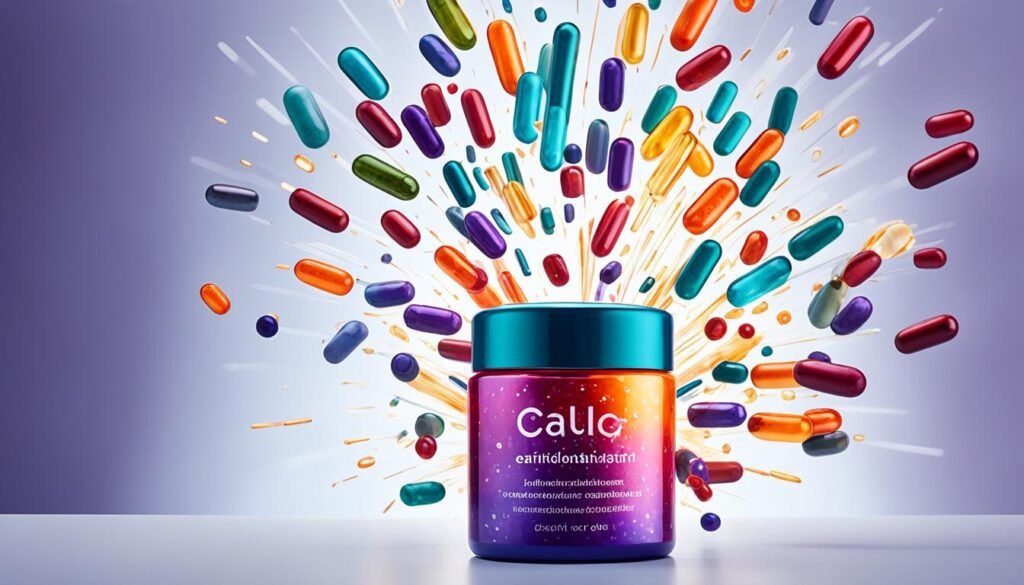
Apart from obtaining antioxidants from natural sources like fruits and vegetables, supplements can also be a convenient way to ensure an adequate intake of these essential compounds. Antioxidant supplements are formulated to provide concentrated doses of specific antioxidants, such as vitamins A, C, and E, selenium, zinc, carotenoids, flavonoids, and other essential nutrients that promote skin health.
Supplements can be a valuable addition to a skincare routine, especially for individuals who may have difficulty obtaining enough antioxidants from their diet alone. These supplements are designed to support the body’s antioxidant defense system, helping to neutralize free radicals and combat oxidative stress, which can contribute to skin aging and other health issues.
However, it is important to exercise caution when incorporating antioxidant supplements into your regimen. Consulting with a healthcare professional is necessary before starting any new supplements to ensure they are safe and appropriate for your individual needs. They can help determine the right dosage and guide you towards supplements that align with your specific skin health goals.
While antioxidant supplements can be beneficial, they should be used in conjunction with a well-rounded diet and lifestyle. Whole foods provide a wide range of nutrients, including vitamins, minerals, and antioxidants, that work synergistically to support overall health. Supplements should not be viewed as a replacement for a healthy diet but rather as a complementary tool to optimize skin health.
Vitamins and Minerals for Skin Health
Vitamins and minerals play a vital role in maintaining and promoting skin health. Here are some key nutrients known for their benefits:
- Vitamin A: Promotes skin cell turnover and helps maintain the integrity of the skin barrier.
- Vitamin C: Supports collagen synthesis, improves skin tone, and helps protect against sun damage.
- Vitamin E: Provides antioxidant protection, helps moisturize the skin, and may have anti-inflammatory effects.
- Selenium: Works synergistically with antioxidants to protect against oxidative stress and maintain skin elasticity.
- Zinc: Essential for skin healing, collagen synthesis, and regulating oil production.
While these nutrients can be obtained through a well-balanced diet, supplements can help bridge any nutritional gaps and ensure optimal intake. However, it is crucial to consult with a healthcare professional to determine the appropriate dosage and identify any potential interactions with medications or existing health conditions.
A well-informed approach to incorporating supplements into your skincare routine can help support skin health and enhance the efficacy of other topical skincare products.
| Antioxidant | Primary Food Sources |
|---|---|
| Vitamin A | Carrots, sweet potatoes, spinach, bell peppers |
| Vitamin C | Oranges, strawberries, kiwi, broccoli |
| Vitamin E | Almonds, sunflower seeds, avocado, spinach |
| Selenium | Brazil nuts, seafood, eggs, brown rice |
| Zinc | Oysters, beef, turkey, pumpkin seeds |
Antioxidants in Skincare Products.
Skincare products that contain antioxidants, such as retinoids, vitamin C, and vitamin E, can offer significant benefits for the skin. These ingredients are well-known for their antioxidant properties, which help protect the skin from free radicals and oxidative stress.
When choosing antioxidant-rich skincare products, it is crucial to consider your individual skin type and any specific concerns you may have. Different antioxidants target specific skincare issues, so selecting the right formulations can provide tailored solutions for your skin.
Retinoids are a popular choice for promoting skin health. They work by stimulating collagen production, reducing the appearance of wrinkles, and improving skin texture.
Vitamin C is another powerful antioxidant that brightens the skin, helps fade dark spots and hyperpigmentation, and boosts natural collagen production.
Vitamin E is known for its moisturizing and soothing properties. It helps protect the skin from environmental damage and strengthens the skin barrier, promoting overall skin health.
When incorporating antioxidant-rich skincare products into your routine, it is essential to follow a comprehensive skincare regimen. This includes cleansing to remove impurities, toning to balance the skin’s pH, moisturizing to hydrate and nourish, and protecting the skin with sunscreen to shield against harmful UV rays.
By selecting the right antioxidant skincare products and following a diligent skincare routine, you can harness the benefits of antioxidants for healthier, more radiant skin.
| Common Antioxidants in Skincare Products | Benefits |
|---|---|
| Retinoids | – Stimulate collagen production – Reduce wrinkles and fine lines – Improve skin texture |
| Vitamin C | – Brighten the skin – Fade dark spots and hyperpigmentation – Boost natural collagen production |
| Vitamin E | – Moisturize and soothe the skin – Protect the skin from environmental damage – Strengthen the skin barrier |
Potential Drawbacks of Antioxidant Use.
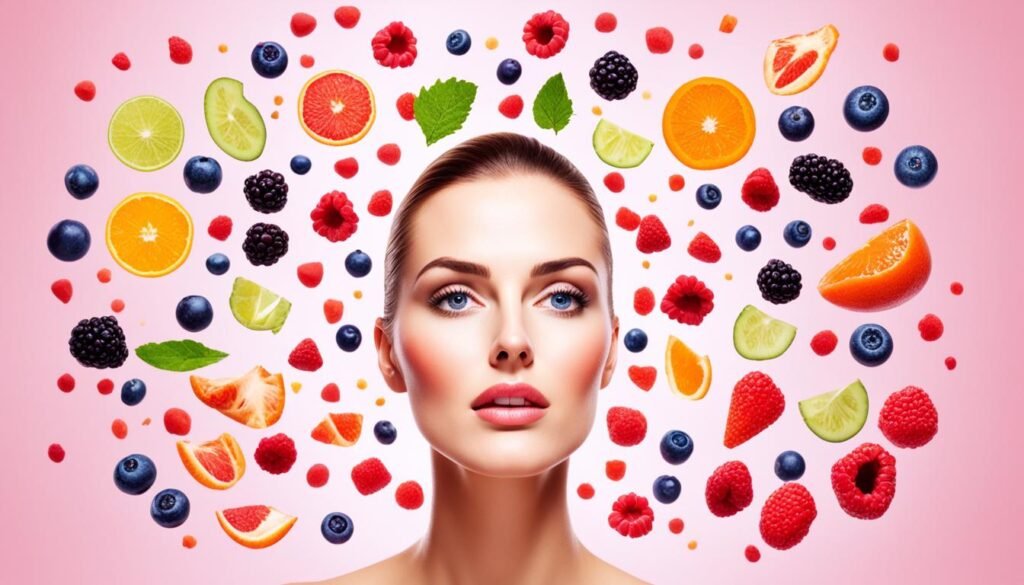
While antioxidants offer numerous benefits for skin health, it is essential to be aware of potential drawbacks. Some individuals may experience skin irritation or allergic reactions when using products containing antioxidants. Additionally, excessive or prolonged use of antioxidants in high doses may have adverse effects.
It is best to use antioxidants as part of a well-rounded skincare routine and consult with a skincare professional or dermatologist for personalized advice.
Precautions with Antioxidant Use
- Avoid using skincare products containing antioxidants if you have known allergies to specific ingredients.
- Perform a patch test before using a new antioxidant-rich product to check for any adverse reactions.
- Follow the recommended usage instructions provided by the product manufacturer to avoid excessive or prolonged use.
- Consult with a healthcare professional if you are considering taking antioxidant supplements to ensure they are safe and appropriate for you.
- Be mindful of the overall antioxidant intake from your diet and supplements, as excessively high doses may have negative effects.
Side Effects of Antioxidants
While side effects of antioxidants are relatively rare, it is important to be aware of potential risks:
“Excessive use of antioxidant supplements may interfere with other medications or therapies.”
It is always recommended to consult with a healthcare professional before starting any new skincare regimen or introducing antioxidant supplements to your routine, especially if you have any underlying health conditions or are taking medications.
| Potential Risks of Antioxidants | Precautions with Antioxidant Use | Side Effects of Antioxidants |
|---|---|---|
| Skin irritation or allergic reactions | Avoid known allergies, perform patch test, follow usage instructions | Interference with medications or therapies |
| Excessive or prolonged use may have adverse effects | Consult with skincare professional or dermatologist, limit overall intake |
When used responsibly and in moderation, antioxidants can provide significant benefits for skin health. By being aware of the potential risks, taking necessary precautions, and seeking professional guidance, individuals can make informed decisions to optimize their skincare routines and achieve healthy, radiant skin.
The Importance of a Healthy Diet for Skin Health.
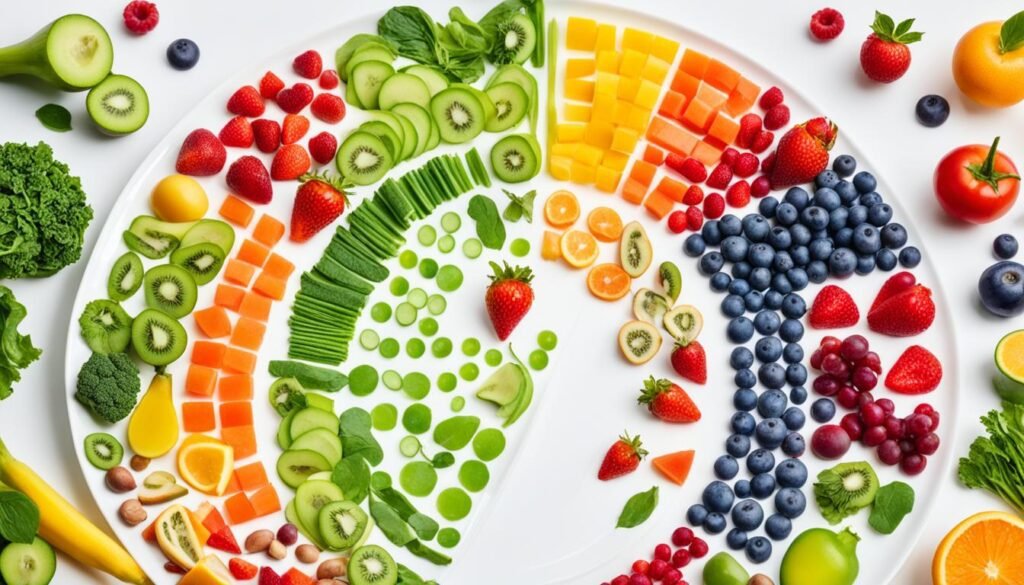
A healthy and varied diet plays a crucial role in supporting overall skin health. Consuming a wide range of fruits, vegetables, whole grains, lean proteins, and healthy fats provides essential nutrients, including antioxidants, vitamins, and minerals, that can help promote healthy skin from within. Adequate hydration and limiting processed foods and sugars are also key factors in maintaining healthy skin.
Eating a nutrient-rich diet is not only beneficial for your overall well-being but can also have a positive impact on your skin. Here are some key considerations when it comes to the relationship between nutrition and skin health:
- Antioxidants: Fruits and vegetables are excellent sources of antioxidants, which can help protect the skin from free radical damage. Antioxidants neutralize these harmful molecules, reducing oxidative stress and promoting a healthy complexion.
- Vitamins and Minerals: A well-balanced diet rich in vitamins A, C, E, and minerals such as zinc and selenium can help support collagen production, improve skin elasticity, and promote a youthful appearance. Including foods like spinach, berries, citrus fruits, nuts, and whole grains in your diet can provide these essential nutrients.
- Hydration: Drinking an adequate amount of water throughout the day is vital for maintaining healthy skin hydration. When your body is well-hydrated, it helps flush out toxins and promotes supple, glowing skin. Aim to drink at least 8 cups of water daily.
- Healthy Fats: Omega-3 fatty acids, found in sources like fatty fish, avocados, and nuts, can help nourish and moisturize the skin from within. These healthy fats contribute to a stronger skin barrier, reducing dryness and improving overall skin health.
A nutritious diet not only benefits your skin health but also supports your overall well-being. By choosing whole, unprocessed foods and incorporating a variety of nutrient-rich options into your meals, you can provide the vital building blocks necessary for healthy, radiant skin.
“A healthy diet rich in antioxidants, vitamins, and minerals is the foundation for vibrant skin.”
The Impact of Diet on Common Skin Conditions
Your dietary choices can also influence certain skin conditions. While diet alone may not be a cure, making mindful choices can support your skin’s health and potentially alleviate symptoms. Here are a few examples:
- Acne: Some studies suggest a link between high-glycemic index foods and acne. Choosing low-glycemic index foods, such as whole grains, legumes, and vegetables, may help reduce the severity and frequency of breakouts.
- Eczema: Certain foods, such as dairy, eggs, and nuts, may trigger eczema symptoms in some individuals. Identifying and avoiding potential triggers can help manage flare-ups.
- Psoriasis: There is ongoing research exploring the potential benefits of an anti-inflammatory diet, rich in fruits, vegetables, fish, and healthy fats, for individuals with psoriasis. While diet alone may not replace medical treatments, it can be a supportive addition to managing symptoms.
Remember, everyone’s skin is unique, and nutritional needs can vary. If you have a specific skin condition, it’s essential to consult with a healthcare professional who can provide personalized guidance tailored to your needs.
The Future of Antioxidant Research in Skincare.

The field of antioxidant research in skincare is constantly evolving, with ongoing studies dedicated to exploring new antioxidants, delivery systems, and formulations. Scientists are continuously seeking to better understand the mechanisms of action of antioxidants and their potential benefits for skin health. These advancements pave the way for innovative skincare products and treatments that harness the power of antioxidants to enhance skin health and rejuvenation in the future.
The Impact of Antioxidants on Skin Conditions.

Antioxidants offer promising potential in improving various skin conditions. Research indicates that lower levels of vitamin E have been found in patients with conditions such as vitiligo, atopic dermatitis, and acne. This suggests that antioxidants, such as vitamin E, may play a significant role in improving these skin diseases. However, further research is needed to fully understand and evaluate the potential of antioxidants for specific skin conditions.
The Role of Antioxidant Therapy for Skin Diseases
Antioxidant therapy involves the use of antioxidants to treat and manage various skin diseases. The aim is to counteract oxidative stress and free radical damage, which are often associated with these conditions. By incorporating antioxidants into skincare routines and treatments, professionals can potentially optimize the therapeutic outcomes for patients.
“Antioxidant therapy shows promise in improving skin conditions by countering oxidative stress and free radical damage.”
Antioxidants, such as vitamins C and E, have demonstrated their efficacy in skin conditions like acne, eczema, and psoriasis. These antioxidants help reduce inflammation, enhance tissue repair, and promote overall skin health. Additionally, they can assist in minimizing the side effects associated with certain dermatological treatments.
Role of Antioxidants in Skin Diseases
Antioxidants play a vital role in combating oxidative stress, which contributes to the development and progression of various skin diseases. By neutralizing free radicals and reducing inflammation, antioxidants help protect cellular integrity and promote healthy skin function.
Moreover, antioxidants can enhance the effectiveness of conventional treatments for skin diseases. For instance, studies have shown that the combination of antioxidants with corticosteroids can improve the outcomes of treatment for conditions like atopic dermatitis and vitiligo.
However, it is important to note that the effectiveness of antioxidants in treating specific skin diseases may vary, depending on the individual and the nature of the condition. Consultation with a healthcare professional or dermatologist is crucial to determine the appropriate use of antioxidants in managing skin diseases.
Achieving Optimal Results with Antioxidant Therapy
Integrating antioxidant therapy into skincare routines and treatments requires a comprehensive approach. This includes selecting the right antioxidants, utilizing appropriate delivery systems, and ensuring optimal concentrations for maximum therapeutic benefits.
The use of antioxidant-rich skincare products, coupled with a healthy diet rich in antioxidant-rich foods, can also contribute to the overall effectiveness of antioxidant therapy. By addressing both internal and external factors, individuals can optimize their skin health and effectively manage skin conditions.
| Skin Condition | Potential Antioxidant Therapy |
|---|---|
| Acne | Topical antioxidants such as vitamin C and tea tree oil can help reduce inflammation and prevent acne breakouts. |
| Eczema | Antioxidants like vitamin E and omega-3 fatty acids can aid in reducing inflammation and supporting skin barrier function. |
| Psoriasis | Systemic antioxidants, including vitamins A, C, and E, can help alleviate inflammation and manage symptoms of psoriasis. |
| Vitiligo | Antioxidants such as vitamin E, alpha-lipoic acid, and glutathione have shown potential in slowing down the progression of vitiligo and promoting repigmentation. |
Conclusion
Antioxidants are an essential component in maintaining and improving skin health. By combating free radicals and oxidative stress, antioxidants offer a wide range of benefits for the skin. They protect against UV radiation, promote hydration, stimulate collagen and elastin production, reduce the appearance of wrinkles and pigmentation, support the healing process, and reduce inflammation.
To incorporate antioxidants into your skincare routine, you can start by consuming a healthy diet rich in antioxidant-packed fruits, vegetables, and whole grains. Additionally, antioxidant supplements can provide concentrated doses of specific nutrients beneficial for skin health. It is important, however, to consult with a healthcare professional before starting any new supplements.
Furthermore, you can choose skincare products that contain antioxidants such as retinoids, vitamin C, and vitamin E. These ingredients are known for their antioxidant properties and can help enhance the overall health and appearance of your skin. Remember to follow a comprehensive skincare routine that includes cleansing, toning, moisturizing, and protecting your skin with sunscreen.
The field of antioxidant research in skincare is continuously evolving, promising even more advancements in skincare formulations and treatments in the future. By incorporating antioxidants into your skincare routine and adopting a healthy lifestyle, you can optimize your skin health and unveil a radiant complexion.
FAQ
What are antioxidants?
Antioxidants are substances that can prevent or delay cell damage by countering free radicals and oxidative stress. They are found in fruits, vegetables, and supplements containing vitamins and minerals.
How do antioxidants improve skin health?
Antioxidants protect the skin from harmful UV radiation, improve hydration, stimulate collagen and elastin production, reduce wrinkles and pigmentation, support healing processes, and reduce inflammation.
What is the role of antioxidants in skincare?
Antioxidants play a crucial role in promoting skin health by counteracting free radicals and oxidative stress.
Why are antioxidants important for skin?
Antioxidants provide benefits such as protection against UV radiation, hydration, collagen and elastin production, reduction of wrinkles and pigmentation, support for healing processes, and inflammation reduction.
What foods contain antioxidants?
Some antioxidant-rich foods include pomegranates, apples, kale, broccoli, berries, coffee, green tea, cacao, herbs, and spices.
Are there antioxidant supplements for skin health?
Yes, supplements containing vitamins A, C, and E, selenium, zinc, carotenoids, flavonoids, and other antioxidants are available and can be used to support skin health.
Can skincare products contain antioxidants?
Yes, many skincare products contain antioxidants such as retinoids, vitamin C, and vitamin E, which can be beneficial for the skin.
Are there any potential drawbacks to using antioxidants?
Some individuals may experience skin irritation or allergic reactions when using products containing antioxidants. Excessive or prolonged use of antioxidants in high doses may also have adverse effects.
How does a healthy diet contribute to skin health?
A healthy and varied diet provides essential nutrients, including antioxidants, vitamins, and minerals, that can help promote healthy skin from within.
What is the future of antioxidant research in skincare?
The field of antioxidant research in skincare is continually advancing, promising future advancements in skincare formulations and treatments that harness the power of antioxidants for enhanced skin health and rejuvenation.
Can antioxidants improve skin conditions?
Antioxidants show potential in improving various skin conditions such as vitiligo, atopic dermatitis, and acne, although further research is still needed.

